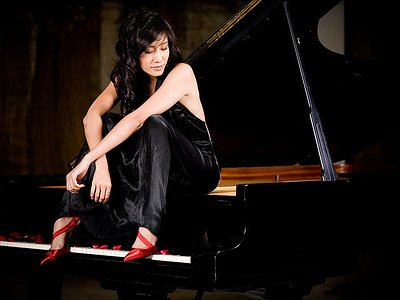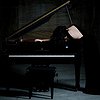Part 2
There are many descriptions of the ideal state of mind for being creative. What is it like for you? What supports this ideal state of mind and what are distractions? Are there strategies to enter into this state more easily?
This is a tough one because I used to think if I allocated time each day, I’d be able to create but creativity is not a switch of a button. I do think for piano practice, first thing in the morning is best as your mind is clear. Maybe it is for songwriting too. I find writing music best at night though, just as long as you don’t have a massive meal and it makes you sleepy :) distractions are definitely the social media side of things which I think is something artists of today have to deal with so much more; it’s finding a balance of exposing your music but also giving yourself time to fine tune your art and create.
As for strategies, I don’t know if there’s a way to ‘enter’ this state of creativity easier. Mark and I take trips away to write, kind of like writing camps and a place we often do this is Bali or the Blue Mountains in Sydney Australia. I’d say this is closest to ‘strategies’ for us as we rent out a villa in Bali, bring recording equipment across, hire a piano and then it becomes a writing haven.
How do you make use of technology? In terms of the feedback mechanism between technology and creativity, what do humans excel at, what do machines excel at?
Humans excel at emotion; there is nothing for me that will replace playing an acoustic grand piano live. The nuances that a performer makes will be forever irreplaceable. Technology has however made it easier for us to have access to sounds that say a few decades ago, would have costed so much money to record a string orchestra live or a drum kick live. It accelerates and cost cuts the music making process, giving us more capabilities and accessibilities to experiment with more sounds. With access to these sounds and plug ins, it will then inspire you to write music in a way which you may not have known was possible. Sounds inspire me a lot and often, you may think you’re out to write this specific style of a song and it ends up completely different because you’ve gone through 100s of synth patches. It’s a magical thing!
Collaborations can take on many forms. What role do they play in your approach and what are your preferred ways of engaging with other creatives through playing together or just talking about ideas?
I am a HUGE advocate of collaborating. As I mentioned, the other half of Double Touch is Mark Olsen and he is the beatmaker, the producer with a different set of ears yet has classical appreciation so I love having direction from other people. I always think, find the best in the field and collaborate. It makes the process faster, better and of course, good energy of people in the studio leads to more creativity.
How is preparing music, playing it live and recording it for an album connected? What do you achieve and draw from each experience personally? How do you see the relationship between improvisation and composition in this regard?
Playing live and performing is what I live for. I was recording a piano album recently for a composer and we recorded for 3 days straight. At the end, we filmed a couple of songs as a live performance and the moment we did this, I had a different level of enjoyment and energy. It was an affirmation that I love performing. The music I write comes alive in recording, packaging it up for an album is like wrapping up a present but playing it live is like opening that present :) we recorded a live session recently and improvised in the performance and how I feel is that we had the composition in its set format, with space to improvise which is best because it’s the spur of the moment, adding to something we crafted in the studio for many many hours. It adds an extra human element to it which I love.
How do you see the relationship between the 'sound' aspects of music and the 'composition' and 'performance' aspects? How do you work with sound and timbre?
Anyone can play the piano if they put in the hours to practice however what makes you unique is your sound. Add emotion and feel into it and it completely changes how you create the sound. Having a good instrument that creates good sound will affect the writing process dramatically for me as the sound itself inspires my choices of harmonies, direction of the piece. In terms of performance, good sound is IT! it brings your performance to the next level and will allow even more inspiration in the performance process.
Our sense of hearing shares intriguing connections to other senses. From your experience, what are some of the most inspiring overlaps between different senses - and what do they tell us about the way our senses work? What happens to sound at its outermost borders?
I have always viewed music as a sensory experience. It’s all connected, you just need to be aware of it. I have a concert series called Perfect Pairings where I pair a different piece of music to each wine, dependent on its body, taste, tannins etc. so for example, a big bold Cabernet Sauvignon will be paired with Rachmaninoff’s Moment Musicaux No. 4. By doing this, I am trying to heighten everyone’s listening experience through taste, vice versa. It’s an awareness thing.
Art can be a purpose in its own right, but it can also directly feed back into everyday life, take on a social and political role and lead to more engagement. Can you describe your approach to art and being an artist?
Art and being an artist is self expression. For me, being able to connect to other humans, especially ones you’ve never met before through sound is remarkable. It triggers emotions, it reminds you of a place, taps into feelings and transports you to a different place; that is why I am an artist and will continue creating. Creating and releasing music also is like a diary. You’re capturing that moment and once it’s out there, it’s there forever.
It is remarkable, in a way, that we have arrived in the 21st century with the basic concept of music and performance still intact. Do you have a vision of music and performance, an idea of what they could be beyond their current form?
I’ve always wanted to make music performance an interactive process. If I could incorporate smells into the process, engage all senses in the music performance experience (from listenership through to the performer themselves), that’d bring it to the next level I think.






